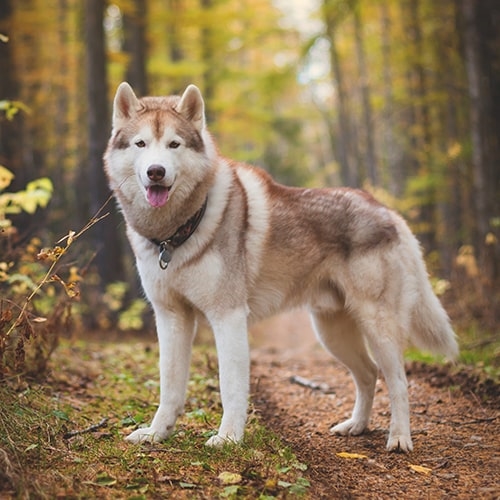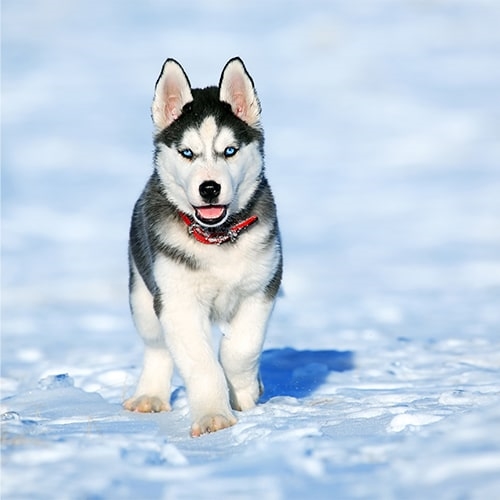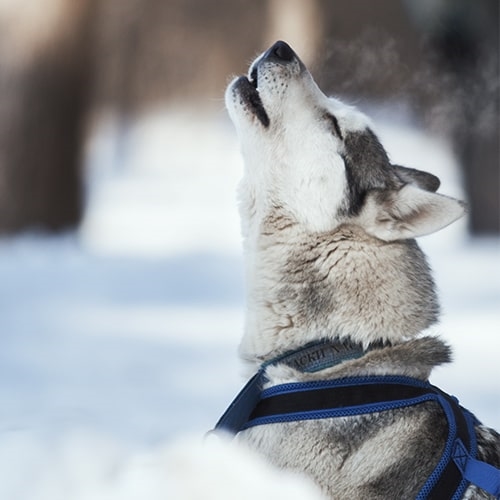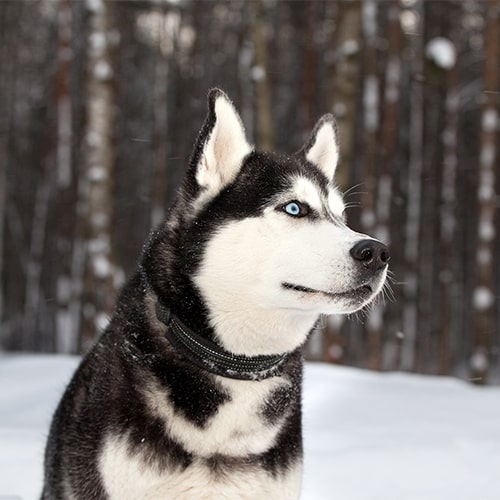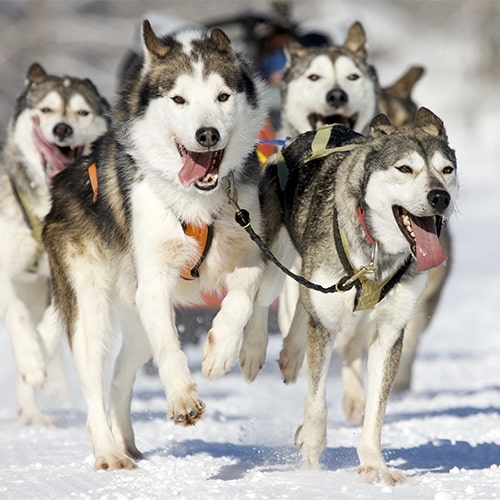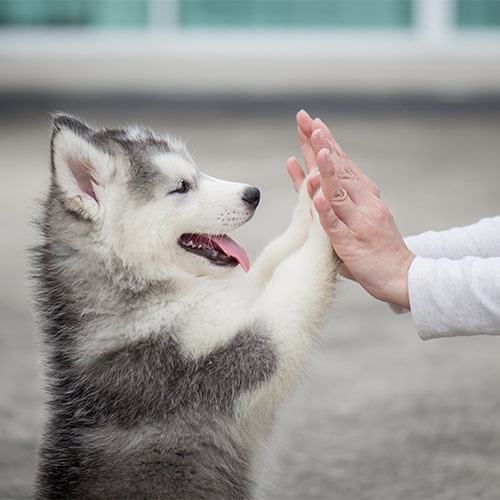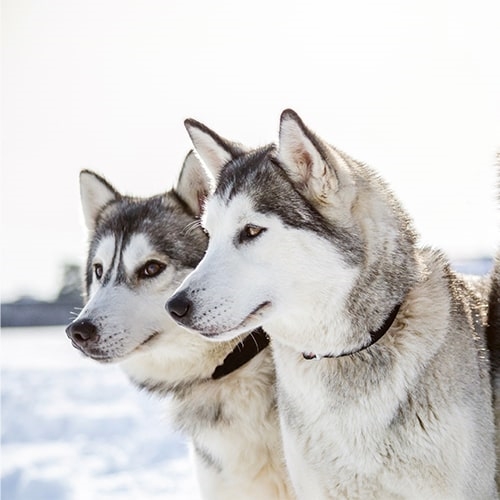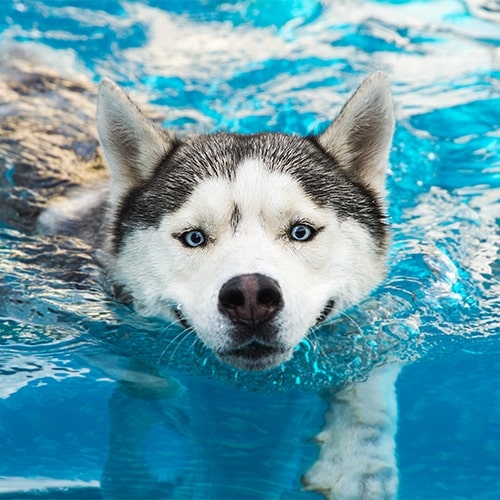| Size | Large |
|---|---|
| Average height | 51-60 cm |
| Average weight | 16-27 kg |
| Average lifespan | Over 10 years |
| Minimum exercise (per day) | 2 hours |
| Coat length | Short |
| Minimum cost (per month) | £105 |
Siberian Huskies are active, intelligent dogs who are always on the go! They are one of the fastest of the sled dog breeds and known for being able to run for hours without tiring. They love people and will want to say hello to everyone they meet.
Huskies were bred for very cold climates and so are the ideal walking partner if you like going up snowy mountains. They’re very intelligent but are also known for being a bit naughty so definitely suit experienced owners who can take on their demanding training and exercise needs
Common health problems in Siberian Huskies
Huskies have really big personalities which is why they’re loved as pets. They adore people and are a real joy to be around. Unfortunately, like so many other purebred dogs, they are at risk of certain problems and conditions relating to their breed.
If you are thinking of buying a Siberian Husky puppy, make sure the parents of your puppy have had the relevant health screening to reduce the chances of your puppy being affected by certain conditions. We’d recommend looking for a Kennel Club Assured Breeder as they meet extra requirements which will benefit your puppy’s health.
Some of the conditions Huskies may develop include:
- Hip dysplasia – where hip joint that doesn’t fit together perfectly, which will eventually lead to arthritis. Before breeding, dogs should be screened by x-rays through the BVA/Kennel Club Hip Dysplasia Scheme.
- Epilepsy.
- Certain cancers.
- Eye problems.
- Cataracts – ‘clouding’ of the lens of the eye affecting vision. Breeding dogs should be screened every year.
- Glaucoma – Increased pressure within the eye which can cause extreme pain and potentially eye loss. There is screening available through KC/BVA.
If you want to minimise the risk of your dog getting problems due to exaggerated features, you can read our advice on choosing a pedigree dog.
Caring for your Siberian Husky
Siberian Huskies are care-free and fun-loving pets who enjoy getting out and about with their owners. They can fit in really well in the right home, but their strength and stamina might not be for everyone. Owners need a very secure garden with high fences as Huskies are known for getting up to mischief – including escape attempts!
Like most dogs, Huskies prefer company and get lonely with no-one around. They are known for being destructive, especially when they get stressed from being alone, so you may find they chew furniture to let you know.
Siberian Huskies and barking
As with any dog, Siberian Huskies are likely to make noise. How much they make is down to the individual dog, their personality and training. While Huskies aren’t known for being big barkers, they do have a reputation for howling and singing to their owners whenever the mood takes them. They’re not the best pets if you have thin walls and close neighbours! If you’re having problems with excessive noise or barking, we recommend seeking the advice of an accredited behaviourist.
Training and socialisation
Siberian Huskies ideally need owners who are familiar with the breed. While they are very intelligent, they’re also independent thinkers and so need consistent, reward-based training throughout their lives. You need to be prepared for your Husky to test boundaries and handle them with a firm but fair attitude. Never shout at or punish your dog as this will seriously set back their training and harm your relationship. If you’re a first-time owner or don’t have much experience of the breed, you may benefit from contacting an accredited trainer for guidance.
Huskies really thrive off company because they are so social. Given the right socialisation from a young age with different people, dogs and experiences, your Husky should be a very confident dog who is happy to say hello to anyone who crosses their path. It might be worth noting that while this is a great personality trait, it also means they’re terrible guard dogs!
Huskies really don’t cope well on their own and ideally need a home where someone is around all the time to keep them company. The breed is known for suffering from separation anxiety so they may not even cope with very short periods alone.
Exercise
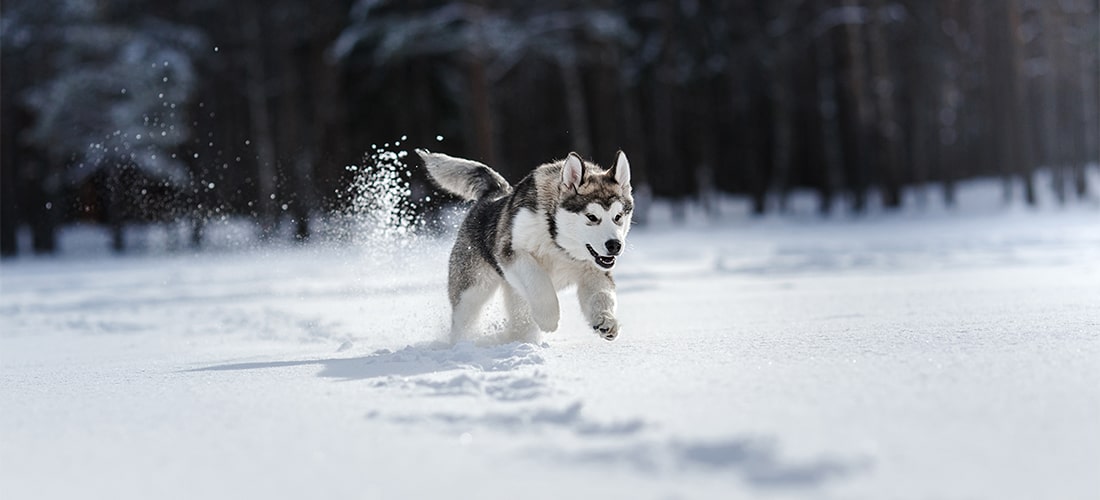
Be aware that Huskies are super active and need loads of exercise, which is ideal if you enjoy the great outdoors. The have heaps of energy and are the perfect pet for active, adventure-loving owners. If you’re thinking of getting a Husky, you’ll need plenty of space and an extremely secure garden for them to play in with plenty of space to run.
Your Husky will need a minimum of two hours of exercise every day. We’d recommend spreading this across the day and vary your walking routes so they don’t get bored. Ideally this should also include off-lead exercise in a secure area. On top of this, your Husky will also need lots of playtime with you and free time in the garden alongside training sessions.
Be careful during the summer months as Huskies have such thick coats they can easily overheat. Keep an eye on them for signs of heatstroke and try to avoid exercising during the hottest parts of the day. Early mornings and evenings are probably the best times to go for long walks and runs.
Grooming
Be prepared – Huskies shed a lot! Because they were bred to live in cold and snowy climates, they have a thick double coat to keep them cosy and warm. This also means they shed a lot more than your average dog throughout the year and even more so in spring and autumn. You’ll need to brush your Husky a few times a week to keep their coat smooth and in good condition.
If you ever need to bath your Siberian Husky, you might want to take them to a professional groomer. Their huge size and sheer amount of fur might make it a bit tricky at home!
Siberian Huskies and children
As long as your Husky has been properly socialised, they’ll enjoy being around children (for the simple fact they love company!). Due to their size and strength, though, we wouldn’t recommend getting a Husky if you have smaller children as they could knock them over accidentally. They suit adult-only households or households with teenagers.
Always supervise your Husky with children and vulnerable adults to avoid any accidents. Although they enjoy being with people, they can sometimes get a bit over-excited and boisterous which can be a surprise to people not used to the breed.
Siberian Huskies and other pets
Huskies love company so as long as they have been socialised from a young age, they should get along fine with other dogs. In fact, many prefer to live with another Husky because they enjoy spending time together.
Huskies have such a high prey drive that we wouldn’t recommend keeping them with smaller pets, even if they have been introduced from a young age. You’ll also need to keep a firm grip on their lead out and about in case they catch the scent of something they might like to chase.
Food
Your Siberian Husky’s diet will vary depending on their age and any health conditions they may have. You’ll need to feed them a complete, balanced dog food to keep them slim and healthy.
Your vet will be able to tell you how much your Husky should be eating. Keep in mind that due to their size, your Husky may eat more than you expect and food bills can quickly rise. You should feed them a good quality, commercially available, complete dog food. We usually recommend splitting their daily allowance into two meals. If you give your dog the occasional treat or use treats for training, remember to take this into account and reduce their daily allowance. Treats shouldn’t make up more than 10% of their daily calorie intake as this can unbalance their diet.
You should try to feed your dog at the same time every day to get them into a routine. Remember to leave at a gap after eating and before exercising.
The cost of owning a Siberian Husky
You can expect your Siberian Husky to cost you a minimum of £105 per month after purchase and set-up costs and over £17,000 across their lifetime.
Costs you’ll need to think about include:
Purchase costs
Adopting an adult Husky from a rescue centre may be a more cost-effective option, with the added advantage of giving a home to a pet without one – check if the rehoming centre you’re looking at asks for a donation for rehoming.
If instead you’re buying a Husky puppy from a breeder, you’ll need to factor in this cost. Beware unusually cheap puppies as they could come from a puppy farm. If you’d like to buy a pedigree puppy, we recommend looking for a Kennel Club Assured breeder. These breeders must do extra health tests and meet high standards.
Set-up costs
- Puppy vaccines – if you rescue a dog, reputable centres will often vaccinate them for you. Remember that ongoing booster vaccinations will be needed to continue their immunity.
- Neutering – you should usually arrange for your dog to be neutered at around 6-12 months old, though your vet will be able to advise you exactly when is best. Check prices at your local practice as these will depend on your vet and where you live. Some rescue centres will neuter any dogs they rehome, saving you this cost.
- Equipment – including a collar and tags, lead, harness, dog beds, dog bowls, pet-safe toothpaste and toothbrushes, grooming brushes and toys. Keep in mind that all these will need to be replaced with wear or damage or if your dog outgrows or damages them!
Ongoing costs
- Food.
- Preventive healthcare – budget for routine vet visits to help stop your dog getting ill and catch any problems early. They need annual check-ups, vaccinations and regular flea and worming treatments. Check if your vet offers a health care plan as this can help spread the cost throughout the year.
- Vet bills* or pet insurance – if you don’t have pet insurance and your dog needs veterinary treatment for an injury or illness, costs can rapidly mount up. Check what’s covered and what isn’t when comparing policies.
- Accessories – including lots of poo bags, replacing worn toys and grooming accessories, buying doggy toothpaste and any other extras they might need.
Other costs
- Training – basic training is very important and dogs can benefit from formal classes. Some dogs may have, or develop, behavioural problems which might need professional management.
- Boarding – you may also need to budget for boarding or dog sitting costs if you are planning to go away from home on holiday.
- Dog walkers/day-care – you might consider a professional dog walker to keep your dog happy and healthy if you’re unable to get out with your dog enough yourself, or to look after them during the day if you need to be out for more than four hours.
* It’s always better to plan ahead and budget or get pet insurance in case your pet gets injured or unwell. If you are having difficulty with veterinary costs, you can check if you are eligible for treatment at PDSA here.
When you welcome a new dog into your life, consider getting dog insurance straight away before any signs of illness start. This will give you peace of mind that you have some financial support if they ever get sick.
Fun facts
- Siberian Huskies love to run! They can run really long distances and not feel the need to rest.
- They’re known for being accomplished escape artists and aren’t for house-proud owners – they’ll often dig holes to try and tunnel under fences.
- Huskies are known for their piercing blue eyes – this might make them appear wolf-like, but their people-loving personalities and genetics are far from it!
- They’re highly intelligent and can pick up on changes in their owner’s body language.
Getting a Siberian Husky
Do plenty of research before getting a Siberian Husky. These high-energy dogs shouldn’t be taken on lightly and need a lot of work from their owners. They love to run and play and spend time with people. They’re an athletic and intelligent breed, so if you have the time and space for them can make wonderful pets.
Rehoming centres
There are plenty of rescue centres across the country where you may find a Siberian Husky. Breed-specific rescues that specialise in Huskies are also out there. You’ll need to ask any rescue centre about the dog’s history to make sure they will be comfortable in your home. Good rescue centres should let you know of any health and behaviour problems.
Breeders
If you buy from a breeder, make sure your puppy will be well socialised and have all necessary screening tests, health checks and vaccinations. It’s really important that Husky puppies from a breeder get the right early socialisation so always ask the breeder about how they go about this. We recommend looking for a Kennel Club Assured breeder as they meet higher standards. We’ve put together some advice to help you find a good breeder.

